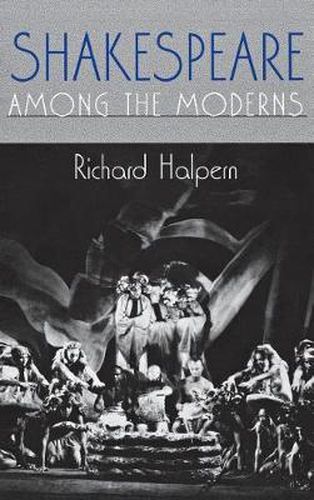Readings Newsletter
Become a Readings Member to make your shopping experience even easier.
Sign in or sign up for free!
You’re not far away from qualifying for FREE standard shipping within Australia
You’ve qualified for FREE standard shipping within Australia
The cart is loading…






Modernist writers, critics, and artists sparked a fresh and distinctive interpretation of Shakespeare’s plays which has proved remarkably tenacious, as Richard Halpern explains in this lively and provocative book. The preoccupations of such high modernists as T. S. Eliot, Wyndham Lewis, and James Joyce set the tone for the critical reception of Shakespeare in the twentieth century. Halpern contends their habits of thought continue to dominate postmodern schools of criticism that claim to have broken with the modernist legacy.
Halpern addresses such topics as imperialism and modernism’s cult of the primitive, the rise of mass culture, modernist anti-semitism, and the aesthetic of the machine. His discussion considers figures as diverse as Orson Welles and Arnold Schwarzenegger, and Shakespeare critics including Northrop Frye, Cleanth Brooks, Stephen Greenblatt, and Stanley Cavell.
Shakespeare’s works have been subjected to a continuing process of historical reinterpretation in which every new era has imposed its own cultural and ideological presuppositions on the plays. The most enduring contribution of modernism, Halpern suggests, has been the juxtaposition of an awareness of historical distance and a mapping of Shakespeare’s plays onto the present. Using modernist themes and approaches, he constructs new readings of four Shakespeare plays.
$9.00 standard shipping within Australia
FREE standard shipping within Australia for orders over $100.00
Express & International shipping calculated at checkout
Modernist writers, critics, and artists sparked a fresh and distinctive interpretation of Shakespeare’s plays which has proved remarkably tenacious, as Richard Halpern explains in this lively and provocative book. The preoccupations of such high modernists as T. S. Eliot, Wyndham Lewis, and James Joyce set the tone for the critical reception of Shakespeare in the twentieth century. Halpern contends their habits of thought continue to dominate postmodern schools of criticism that claim to have broken with the modernist legacy.
Halpern addresses such topics as imperialism and modernism’s cult of the primitive, the rise of mass culture, modernist anti-semitism, and the aesthetic of the machine. His discussion considers figures as diverse as Orson Welles and Arnold Schwarzenegger, and Shakespeare critics including Northrop Frye, Cleanth Brooks, Stephen Greenblatt, and Stanley Cavell.
Shakespeare’s works have been subjected to a continuing process of historical reinterpretation in which every new era has imposed its own cultural and ideological presuppositions on the plays. The most enduring contribution of modernism, Halpern suggests, has been the juxtaposition of an awareness of historical distance and a mapping of Shakespeare’s plays onto the present. Using modernist themes and approaches, he constructs new readings of four Shakespeare plays.